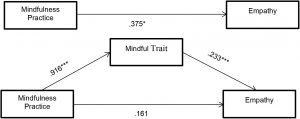Increase Empathy with Mindfulness
By John M. de Castro, Ph.D.
“as we pay attention to our breath, our body, our lives, in this simple and gentle way, a natural consequence is the opening of the heart.” – Matthew Brensilver
Humans are social animals. This is a great asset for the species as the effort of the individual is amplified by cooperation. In primitive times, this cooperation was essential for survival. But in modern times it is also essential, not for survival but rather for making a living and for the happiness of the individual. This ability to cooperate is so essential to human flourishing that it is built deep into our DNA and is reflected in the structure of the human nervous system.
Mindfulness has been found to increase prosocial emotions such as compassion, and empathy and prosocial behaviors such as altruism. “empathy seems to play a key role in forgiveness and compassion toward oneself and others, allowing the maintenance, reconciliation and repair of social relationships.” So, promoting empathy is important for not only for the individual’s well-being but also for the individual’s relationships with others.
In today’s Research News article “.” (See summary below or view the full text of the study at: https://www.frontiersin.org/articles/10.3389/fpsyg.2020.01915/full?utm_source=F-AAE&utm_medium=EMLF&utm_campaign=MRK_1401267_69_Psycho_20200811_arts_A) de la Fuente-Anuncibay and colleagues recruited university students and had them complete measures of mindfulness practice, empathy, and mindfulness, including describing, observing, acting with awareness, non-judging, and non-reacting subscales. The data were examined with regression analysis and mediation analysis.
They found that the higher the levels of mindfulness the higher the levels of empathy. This was true for overall mindfulness and the describing and observing facets of mindfulness. In examining the effect of mindfulness practice on empathy they found that there was no direct effect of practice on empathy but rather practice was associated with higher levels of mindfulness which was in turn associated with higher levels of empathy. Again, this was true for overall mindfulness and the describing and observing facets of mindfulness. Gender was not found to moderate these associations.
These results are correlational and as such caution must be exercised in concluding causation. Nevertheless, previous studies have shown that mindfulness training results in increase in empathy. So, the present results probably represent causal relationships. These results then suggest that mindfulness produces greater empathy and that mindfulness is enhanced by mindfulness practice. It is interesting that these relationships are similar for both men and women as there is a societal belief that women are more empathetic. These findings demonstrate that mindfulness improves empathy regardless of gender.
It is interesting that the relationship of mindfulness with empathy was true not only for overall mindfulness but also for the describing and observing facets of mindfulness. These facets represent that individual’s ability to observe and describe their internal state. Mindful individuals are more aware of how they are feeling. This suggests that awareness of one’s own feelings helps to better understand the feelings of others which is the essence of empathy.
So, increase empathy with mindfulness.
“By learning to bring our thoughts and feelings into the present and allowing them to be as they are, we become more mindful of ourselves. That enhanced mindfulness of ourselves makes it easier to read-across to the experiences of others. Just a small amount of mindfulness training can make it easier to read people’s inner states. Mindful people tend to experience more compassion and more empathy, because they have more control over their thinking.” – Mindfulness Works
CMCS – Center for Mindfulness and Contemplative Studies
This and other Contemplative Studies posts are also available on Google+ https://plus.google.com/106784388191201299496/posts and on Twitter @MindfulResearch
Study Summary
de la Fuente-Anuncibay R, González-Barbadillo Á, Ortega-Sánchez D and Pizarro-Ruiz JP (2020) Mindfulness and Empathy: Mediating Factors and Gender Differences in a Spanish Sample. Front. Psychol. 11:1915. doi: 10.3389/fpsyg.2020.01915
Numerous research studies link mindfulness training to improved empathy. However, few studies focus on the mediating factors of empathy. This work has three objectives: (a) to analyze the possible mediation of mindfulness as a feature in this relation, (b) to analyze the mindfulness factors that mediate in the increase of empathy and (c) to analyze the moderating role of gender. The sample was composed of 246 Spanish-speaking university students (M = 24.08 years, SD = 8.43). The instruments used were the Five Facet Mindfulness Questionnaire (FFMQ) and the Toronto Empathy Questionnaire (TEQ). For data analysis, the indirect effect was calculated using 10000 bootstrap samples for the bias-corrected bootstrap confidence intervals (BCI). The improvement of empathy is mediated by the changes in mindfulness trait (B = 0.233, p < 0.001), disappearing in the presence of this mediator, the direct effect of mindfulness practice on empathy (B = 0.161, p = 0.394). We did not find a differential functioning of this mediation according to gender. Observing and describing are the FFMQ factors that mediate significantly between mindfulness practice and empathy.
